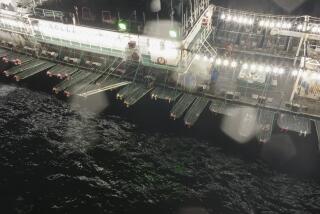BUSH IN EASTERN EUROPE : Lenin Shipyard Getting First Aid From U.S. Pharmaceutical Heiress
- Share via
GDANSK, Poland — The gray steel gates of the Lenin Shipyard, where President Bush spoke on Tuesday, are Poland’s most vivid symbol of popular revolt against communism. It was here, in 1980, that workers rose up to demand more say in their own lives; over this fence clambered a militant electrician named Lech Walesa to turn the uprising into a movement called Solidarity.
But now the rusty, sprawling plant is about to become a symbol of another kind of change. Threatened with collapse in the harsh new world of economic reform, the Lenin Shipyard has done what every Pole dreams of: It has stumbled across a rich American aunt who wants to send money--lots of money.
The unlikely aunt is Barbara Piasecka Johnson, the Polish-born heiress to a $350-million American fortune who lives on an estate in Princeton, N.J. In a gambit unprecedented in the Communist world, Poland has agreed to sell Johnson a majority ownership of its largest shipyard--in exchange for her commitment to try to revive the flagging plant with as much as $100 million in new capital.
Johnson, 52, is a former chambermaid who married a scion of the Johnson & Johnson drug fortune in 1971 (she was 34 and he 76). But to the grizzled workers, union leaders and strike veterans of Gdansk, she is nothing less than an angel in their hour of need.
“For 400 years, Poland has been looking for a savior,” said Henryk Drazkowski of the shipyard’s Solidarity committee. “For 40 years, we in Gdansk have been looking for a woman like Mrs. Johnson.
“I told her that at our first meeting,” he added, “and she burst into tears.”
Persuaded to Visit Poland
By all accounts, Johnson’s commitment to rescue the decaying shipyard--and its 8,500 jobs--was launched in a burst of emotional support for Solidarity and Walesa, its charismatic leader.
Father Henryk Jankowski, Walesa’s top religious adviser, visited Johnson in New Jersey and persuaded her to visit Walesa last May. Only a week after her arrival in Gdansk, on June 1, she signed a letter of intent to buy the yard--and, at the public announcement of the deal, burst into tears again.
“She is our hope to be saved from absolute disaster,” Jankowski said.
Johnson herself has refused to talk with reporters--stung by articles that painted her as a naive socialite or focused on her battle with the Johnson family over the estate of her late husband, J. Seward Johnson, who died in 1983.
But both Solidarity and Communist Party officials describe her as a canny businesswoman who is intent on making her audacious venture a success. “She is a very serious person, and I don’t think she’s going to let anyone cheat her,” said Alojzy Szablewski, Solidarity’s chairman at the shipyard.
Johnson’s action saved the shipyard and its welders, fitters and electricians from a government proposal to close the unprofitable operation--a plan the opposition believed was really a political slap at Solidarity’s greatest symbol.
Now, however, Johnson is trying to learn exactly what it is she is buying--and how it can be turned around after years of money-losing, government-subsidized operations.
A team of Western shipyard experts is due to arrive today to survey the plant, see how much of its equipment is usable and estimate its value, officials said. After that, a financial team will attempt to produce a realistic balance sheet, something the government never had to do.
The most ticklish question will almost surely be whether some jobs must be eliminated to make the yard more efficient. Solidarity’s Szablewski said his union members are in favor of cutting the shipyard’s ranks of white-collar bureaucrats--but not blue-collar jobs. “We hope there will be an increase in jobs,” added Drazkowski.
Warning on Layoffs
But Czeslaw Tolwinski, the shipyard’s current, Communist manager, warned that a takeover by capitalists could well lead to layoffs. “The new management is going to begin with the question of profit, and the number of ships that are to be produced, and then determine the size of the staff from there,” he said. Indeed, Western experts have long noted that Polish shipyards are overstaffed by Western standards.
Nevertheless, Tolwinski said the Communist government is only too anxious to turn over the plant, and its $2.5-million annual losses, to someone else. “We’d just like to finalize it as soon as possible,” he said.
Whether the shipyard can be made profitable is a question no one in Gdansk seems ready to answer. Neither Solidarity nor the government has made a serious study of how the yard, a jumble of aging equipment and rusting cranes, could be restructured. South Korea, with its low labor costs and extraordinary efficiency, has virtually driven most other industrialized countries from shipbuilding.
“What is needed most is a change in the workers’ mentality,” said Tolwinski, the Communist boss, sounding like a capitalist. “They must shift to new thinking about work efficiency and productivity.”
But, he acknowledged, his view is already less important than the union’s.
“You could say that Solidarity is already running this yard,” he said, a little wearily, before taking his seat at the Solidarity-organized reception for Bush.
More to Read
Sign up for Essential California
The most important California stories and recommendations in your inbox every morning.
You may occasionally receive promotional content from the Los Angeles Times.














